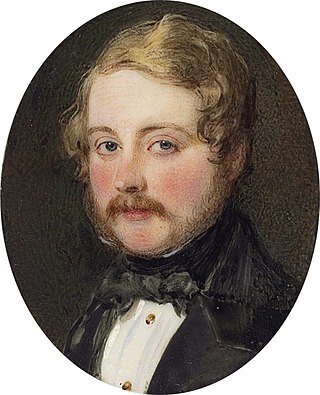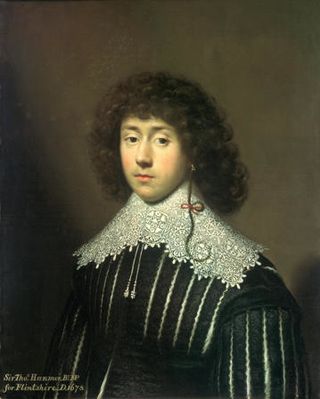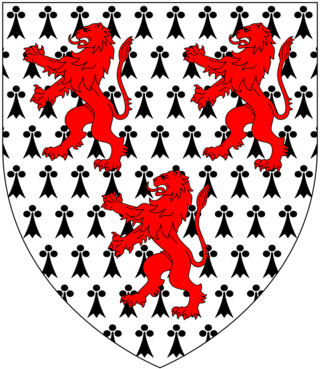
Marquess of Bristol is a title in the Peerage of the United Kingdom held by the Hervey family since 1826. The Marquess's subsidiary titles are Earl of Bristol, Earl Jermyn, of Horningsheath in the County of Suffolk (1826), and Baron Hervey, of Ickworth in the County of Suffolk (1703). The Hervey barony is in the Peerage of England, the earldom of Bristol in the Peerage of Great Britain and the Jermyn earldom in the Peerage of the United Kingdom. Earl Jermyn is used as courtesy title by the Marquess's eldest son and heir. The Marquess of Bristol also holds the office of Hereditary High Steward of the Liberty of St Edmund. The present holder of these titles is Frederick Hervey, the 8th Marquess and 12th Earl of Bristol.

Earl of Buckinghamshire is a title in the Peerage of Great Britain. It was created in 1746 for John Hobart, 1st Baron Hobart.
There have been two baronetcies created for persons with the surname Hobart, one in England and one in the United Kingdom, with both creations for branches of the same family.
There have been two baronetcies created for people surnamed "Bailey", both in the Baronetage of the United Kingdom and extant as of 2010.

Elizabeth Christiana Cavendish, Duchess of Devonshire was an English aristocrat and letter writer. She is best known as Lady Elizabeth Foster, the close friend of Georgiana Cavendish, Duchess of Devonshire. Elizabeth supplanted the Duchess, gaining the affections of William Cavendish, 5th Duke of Devonshire and later marrying him. Several of her letters are preserved.

The Hervey-Bathurst baronetcy, of Lainston in the County of Southampton, is a title in the Baronetage of the United Kingdom. It was created on 7 December 1818 for Felton Hervey-Bathurst, with remainder, failing heirs male of his own, to the heirs male of his father. Hervey-Bathurst was the grandson of the Hon. Felton Hervey, seventh son of John Hervey, 1st Earl of Bristol, and served as an Aide-de-Camp to the Duke of Wellington after the Battle of Waterloo.

The ffolkes Baronetcy, of Hillington in the County of Norfolk, is a title in the Baronetage of Great Britain. It was created on 26 May 1774 for Martin ffolkes, FRS later High Sheriff of Norfolk and Member of Parliament for King's Lynn. The second Baronet represented Norfolk and Norfolk West in the House of Commons while the third Baronet represented King's Lynn. The fifth Baronet was Honorary Chaplain to Queen Victoria, Chaplain-in-Ordinary to Edward VII and George V and Chaplain to Edward VIII and George VI.
There have been three baronetcies created for persons with the surname Clayton, two in the Baronetage of Great Britain and one in the Baronetage of the United Kingdom. One creation is extant as of 2021.

Sir Augustus John Foster, 1st Baronet, was a British diplomat and politician. Born into a notable British family, Foster served in a variety of diplomatic functions in continental Europe and the United States, interrupted by a short stint as a member of parliament. He wrote about his American experiences in Notes on the United States of America.

Sir Henry Hervey Bruce, 3rd Baronet PC (Ire) was an Irish Conservative politician. He was Member of Parliament for Coleraine from 1862 to 1874, and from 1880 to 1885.

Sir Thomas Hanmer, 2nd Baronet (1612–1678) was an English politician who sat in the House of Commons in 1640 and from 1669 to 1678. He was a Royalist during the English Civil War and raised troops for Charles I. In his personal life, he was a keen horticulturist. He is not to be confused with Sir Thomas Hanmer, 2nd Baronet (1747–1828) of the second creation, nor with his grandson, Sir Thomas Hanmer, 4th Baronet.

The Champion de Crespigny Baronetcy, of Champion Lodge, Camberwell, in the County of Surrey, was a title in the Baronetage of the United Kingdom, created on 31 October 1805 for Claude Champion de Crespigny.

The Chudleigh Baronetcy, of Ashton in the County of Devon, was a title in the Baronetage of England. It was created on 1 August 1622 for George Chudleigh (d.1656), Member of Parliament for St Michael's, East Looe, Lostwithiel and Tiverton. The title became extinct on the death of the sixth Baronet in 1745.

Sir Jermyn Davers, 4th Baronet, of Rougham and Rushbrooke, Suffolk, was an English landowner and Tory politician who sat in the House of Commons from 1722 to 1743.

Sir Charles Davers, 6th Baronet was a British Army officer and politician who sat in the House of Commons from 1768 to 1802.
Sir Francis Vincent, 7th Baronet, of Stoke D'Abernon, was an English country landowner and politician who sat in the House of Commons from 1761 to 1775.
The Honourable George Vere Hobart was a British politician who served as Lieutenant Governor of Grenada, West Indies. He was the father of the 5th Earl of Buckinghamshire.

The Stapleton Baronetcy, of the Leeward Islands, is an extinct title in the Baronetage of England. It was created on 20 December 1679 for William Stapleton, who followed Charles II into exile in France, and after the Restoration was appointed deputy-governor of Montserrat and captain-general of the Leeward Islands.
Major-General Fitzgerald Wintour was a British military officer who served in the Queen's Own Royal West Kent Regiment and the Royal Norfolk Regiment. Wintour was commissioned in the British Army in 1880 and fought in the Anglo-Egyptian War, the Mahdist War, the Tochi Expedition, the Second Boer War, and in World War I. He was made a Companion of the Order of the Bath and a Commander of the Order of the British Empire for his military service. Wintour was the father of newspaper editor Charles Wintour and of Cordelia James, Baroness James of Rusholme. He was the grandfather of Dame Anna Wintour and Patrick Wintour.
Cordelia Mary James, Baroness James of Rusholme was a British teacher and judicial officer. She served as a justice of the peace and as chairwoman on the report of the Howard League for Penal Reform's Working Party on Custody During Trial. Wintour was the wife of fellow educator Eric James, Baron James of Rusholme, who was created a life peer in 1959. She was an aunt of Vogue editor-in-chief Dame Anna Wintour.














